Triple oppression is a theory developed by black socialists in the United States, such as Claudia Jones. The theory states that a connection exists between various types of oppression, specifically classism, racism, and sexism. It hypothesizes that all three types of oppression need to be overcome at once. It is also referred to as "double jeopardy", Jane Crow, or triple exploitation.
Oppression is malicious or unjust treatment or exercise of power, often under the guise of governmental authority or cultural opprobrium. Oppression may be overt or covert, depending how it is practiced. Oppression refers to discrimination when the injustice does not target and may not directly afflict everyone in society but instead targets specific groups of people.
Socialist feminism rose in the 1960s and 1970s as an offshoot of the feminist movement and New Left that focuses upon the interconnectivity of the patriarchy and capitalism. Socialist feminists argue that liberation can only be achieved by working to end both the economic and cultural sources of women's oppression. Socialist feminism is a two-pronged theory that broadens Marxist feminism's argument for the role of capitalism in the oppression of women and radical feminism's theory of the role of gender and the patriarchy. Socialist feminists reject radical feminism's main claim that patriarchy is the only or primary source of oppression of women. Rather, Socialist feminists assert that women are unable to be free due to their financial dependence on males. Women are subjects to the male rulers in capitalism due to an uneven balance in wealth. They see economic dependence as the driving force of women's subjugation to men. Further, Socialist feminists see women's liberation as a necessary part of larger quest for social, economic, and political justice. Socialist feminists attempted to integrate the fight for women's liberation with the struggle against other oppressive systems based on race, class, sexual orientation, or economic status.
Group 8 was a feminist organization in Sweden, founded by eight women in Stockholm in 1968. The organization took up various feminist issues such as: demands for expansions of kindergartens, 6-hour working day, equal pay for equal work and opposition to pornography. Initially the organization was based in Stockholm, but later local groups were founded throughout the country. Although Group 8 dissolved in the early 2000s, their influence on feminism in Sweden is still prevalent.

Eva Elisabet Dahlbeck was a Swedish stage, film, and television actress. She received a Cannes Film Festival Award for Best Actress for her performance in the film Brink of Life (1958). Dahlbeck retired from acting in 1970 and became an author.
Women to the Top (W2T) was a European project for bringing more women into top management. It was funded by the European Commission and ran 2003-2005 in Estonia, Denmark, Greece and Sweden, culminating in a transnational conference in Stockholm, 24–25 January 2005. The total budget was 5.6 million SEK. The project was directed toward private and public employers.
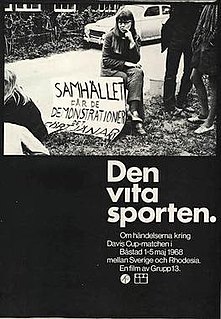
The White Game is a 1968 Swedish documentary film about the protests against the 1968 Davis Cup tennis match between Sweden and Rhodesia, in Båstad, Sweden.

Anna Whitlock, was a Swedish reform pedagogue, journalist, suffragette and feminist. She was co-founder and twice chairperson of the National Association for Women's Suffrage.
Yvonne Svanström,, is an associate professor and head of the Department of Economic History at Stockholm University.
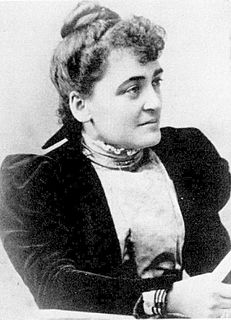
Cecilia Milow, was a Swedish author, translator, educator, campaigner and suffragette.

Marie Sophie Schwartz née Birath, was a Swedish writer. She has been referred to as the most successful female writers of the late 19th-century in Sweden.
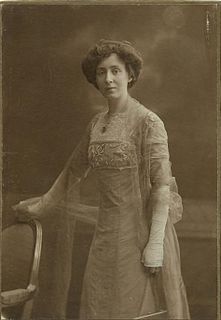
Ellen Helga Louise Hagen was a Swedish suffragette, women's rights activist and politician. She was a member of the National Association for Women's Suffrage, the chairperson of Liberala kvinnor in 1938–1946 and Svenska Kvinnors Medborgarförbund in 1936–1963. During the 1920s and 1930s, she was internationally active within peace work and the Swedish delegate in the international peace conference in Paris in 1931.
The National Centre for Knowledge on Men's Violence against Women is a Swedish knowledge and resource centre at Uppsala University, founded in 2006. NCK is working on behalf of the Government of Sweden to raise awareness at the national level of men's violence against women, and develops new methods for the treatment of abused women. NCK has a mandate to research, educate, compile and spread information. In 2008, its operations expanded to include violence and oppression in the name of honour, and violence in same-sex relationships.
Arbetet was a Swedish-language social democrat newspaper published in Malmö, Sweden, between 1887 and 2000.
Carola Hansson-Boëthius is a Swedish novelist, dramatist and translator.

Events from the year 1741 in Sweden
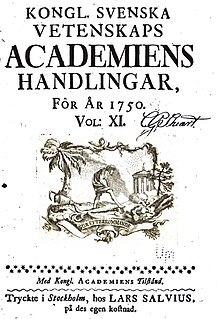
Events from the year 1739 in Sweden

Elma Danielsson née Sundquist, was a Swedish journalist and politician. She was a journalist and temporary editor of the social democratic paper Arbetet from 1887 onward, and has been referred to as the first woman in the social democratic press.
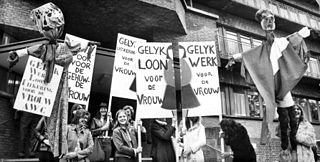
The women's liberation movement in Europe was a radical feminist movement that started in the late 1960s and continued through the 1970s and in some cases into the early 1980s. Inspired by developments in North America and triggered by the growing presence of women in the labour market, the movement soon gained momentum in Britain and the Scandinavian countries. In addition to improvements in working conditions and equal pay, liberationists fought for complete autonomy for women's bodies including their right to make their own decisions regarding contraception and abortion, and more independence in sexuality.
Gunhild Kyle was a Swedish historian. She was Sweden's first professor of women's history at the University of Gothenburg.










